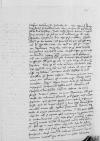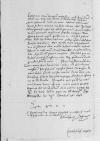Letter #1379
Cornelis DE SCHEPPER to Ioannes DANTISCUSBrussels, 1535-12-06
English register:
De Schepper informs Dantiscus that he sent him two letters from Lüneburg [cf. IDL 1356, IDL 1367], entrusting them to Mayor of Lübeck, Nikolaus Brömse.
De Schepper reports on his and Godschalk [Ericksen's] stay in Münster in Westphalia, where they saw the impressive fortifications built by the Anabaptists and one of the cages in which the Anabaptist leaders [Jan Beuckelszoon van Leyden, Bernt Knipperdollinck and Bernhard Krechtinck] are to be put [after their execution]. They also made a futile attempt to convert Knipperdollinck and Krechtinck, visiting them in prison.
Next they went to Antwerp where they reminisced about Dantiscus when speaking with Veyt Herle and other friends of old. They wondered if Dantiscus was still alive. Godschalk stayed in Antwerp, while De Schepper set off for Brugge to deal with personal matters.
De Schepper writes that he will spend the winter at the court [of Queen Mary]. He expects that Godschalk will come there, too. He sends Dantiscus greetings from Dean Mark Laurijn, his own wife [Elisabeth Donche] and his son [Cornelis jr.]. The little boy is plump and looks a lot like Dantiscus.
De Schepper recounts the news: the Duke of Milan [Francesco II Sforza] died on 1 November. Based on his will, his widow received the Marquisate of Vigevano, while the whole Duchy [of Milan] and 1,200,000 ducats went to Emperor Charles. God has also blessed the Emperor with the discovery of a gold mine in America, this news coming from Dantiscus' sponsor Ehinger. The Emperor spent a long time in Sicily where he collected substantial taxes as well as receiving 250,000 ducats as a gift. Next he went via Calabria towards Naples.
Papal Nuncio Pier Paolo Vergerio, who was in the Low Countries recently, announced that the Pope [Paul III] had agreed to hold a council in Mantua. The King of England [Henry VIII], who sentenced the Cardinal of Rochester [John Fisher] and Thomas More to death, has allegedly been excommunicated and his Kingdom interdicted.
Peace reigns in the Low Countries. Meanwhile, the Danes and the inhabitants of Holstein and Lübeck are rebelling; their fear for their own fate is making them reflect on [the candidacy of] Prince Palatine Friedrich [II von Wittelsbach]. Their mission will arrive in the Low Countries soon. The Emperor supports the Prince Palatine as the husband of his niece [Dorothea of Denmark]. Hoping that Dantiscus will mention this to his neighbours [i.e. Duke Albrecht of Prussia], De Schepper informs him of existing peace treaties between the Emperor and Christian [III of Oldenburg], Duke of Holstein, and between Lower Germany and Denmark, underlining that they contain no mention of Christian being entitled to the Kingdom of Denmark.
De Schepper indicates that he knows that Poland provided financial and military support to the Duke of Holstein’s faction. Knowing the peaceable attitude of the king [Sigismund I], he expresses the hope that this support was not directed against the Palatinate [of the Rhine] but was only devised to keep the city of Lübeck in check. Queen Mary offered to act as a mediator in the conflict, but Christian [III of Oldenburg] turned her down. In view of his refusal the Queen will support the Prince Palatine. The Emperor has written from Africa and Sicily, calling for efforts to achieve a peaceful resolution of the conflict.
De Schepper thinks that the King of Denmark [Christian II] deserves a lesser punishment than he is suffering; he is also outraged at the shameful treatment of his daughters [Dorothea of Denmark and Christiana of Denmark].
He jokingly complains that the anticipated ban on navigation and trade will deprive him of Gdańsk beer. Regardless of who might win, De Schepper fears the disastrous effects of an armed conflict and therefore fervently supports peaceful resolutions. He draws Dantiscus’ attention to the fact that it is a bishop’s duty to foster peace, and encourages him to persuade his neighbour the Duke [Albrecht I von Hohenzollern-Ansbach] to get involved in the mediation in Denmark. He himself will make a similar effort with Duke Frederick, on condition that someone persuades the other side to pursue peace as well.
The Count of Nassau suffers from gout but will come to the court soon. The King of France [Francis I] is taking no action. In De Schepper’s view, if it were not for his health problems he would have tried to seize the Duchy of Milan after the Sforza family died out. Overwhelmed by their misfortunes, the Swiss are not venturing out of their territory. There are many German foot soldiers in the Münster diocese, waiting for one of the dukes to take them into his pay. The Duke of Guelders [Charles II] has calmed down thanks to the French crowns paid to him.
From letters recently received, De Schepper learned that Erasmus of Rotterdam has published Ecclesiastes and turned down the church offices offered to him by the Pope [Paul III]. De Schepper presumes that Dantiscus already owns Ecclesiastes. He cannot send him the Books of Psalms because he does not have them to hand.
De Schepper is sending this letter through a Pole [Stanisław Cypser] who is just departing. He promises to send a longer one through the Fuggers. He asks Dantiscus for news. He commends himself to his mother, brothers, sisters and relatives. De Schepper’s neighbour [De Baillieul], the mother of Dantiscus’ young servant [Carolus de Tautenberg], commends her son to Dantiscus. De Schepper also encloses a letter to the young man. De Schepper asks to be recommended to Georg Klingenbeck, whom he knows from Spain and Augsburg, if he is still alive.
| received [1536]-01-18 Manuscript sources:
Early printed source materials:
Prints:
| ||||||||||||||||||||||||||||||||||||||||||||
Text & apparatus & commentary Plain text Text & commentary Text & apparatus
Reverendissimo in Christo Patri et Domino, domino
Reverendissime in Christo Pater et Domine, domine ex animo honorandissime.
Ex
Cum orig. Quum⌈CumCum orig. Quum⌉
Ceterum, cum orig. quum⌈cumcum orig. quum⌉ mihi
Rerum novarum apud nos aliud nihil est.  UUB H. 154, f. 146v
appendentiis. Est
UUB H. 154, f. 146v
appendentiis. Est
Idem
Fuit hic his diebus
Hic secura in pace versamur, quantumvis tumultuentur  UUB H. 154, f. 147r
UUB H. 154, f. 147r
Scio apud vos esse, qui aliter rem depraedicant orig. depredicant⌈depraedicantdepraedicant orig. depredicant⌉, neque clam nobis est, quod partes
Quid enim magis indignum, quam duas
Haec ob id scribo, quod videor cariturus cerevisia vestra Pruthenica clauso  UUB H. 154, f. 147v
iocum.
UUB H. 154, f. 147v
iocum.
Praesulum orig. Presulum⌈PraesulumPraesulum orig. Presulum⌉ omnium muneri convenire nosti pacem ubique, quoad possunt, nisi cum vitiis, procurare. Vicinus es
ms 1 temperant[...] paper damaged⌈temperantiams 2 temperantia,
ms 1 temperant[...] paper damaged⌉ opus est. Victoriam pauci hactenus aut voluere aut scivere sequi. Facilius ea paratur, quam conservatur, atque ut maxime talis sit, quam tueri possis, nisi tamen aequitatis robore fulciatur, brevi labi solet. Haec tibi et amico privatus ego, neque enim omittere possum, quin de bonis rebus tecum per litteras commenter. Ea via est, per quam nonnulli sibi
Illustrissimus  UUB H. 154, f. 148r
Laboravit etiam adversa valetudine apud Burgundionem,[3] alias iam inhiaret
UUB H. 154, f. 148r
Laboravit etiam adversa valetudine apud Burgundionem,[3] alias iam inhiaret
In litteris his diebus nihil novi prodiit, praeter cf. Erasmus Roterodamus, Ecclesiastes Sive De Ratione Concionandi libri quatuor opus recens nec antehac a quoquam excusum, Basel, Hieronymus Frobenius, 1535-08 ⌊Ecclesiastamcf. Erasmus Roterodamus, Ecclesiastes Sive De Ratione Concionandi libri quatuor opus recens nec antehac a quoquam excusum, Basel, Hieronymus Frobenius, 1535-08 ⌋
Plura impraesentiarum scribere me vetat huius latoris, viri Poloni, nunc primum nuntiatus orig. nunciatus⌈nuntiatusnuntiatus orig. nunciatus⌉ recessus. Per
Est apud te
Et vale, Domine et Pater ex animo honorande.
Ex
Eiusdem Reverendissimae Dominationis Vestrae addictissimus inservitor
Postscript:
Si superest magnificus dominus





